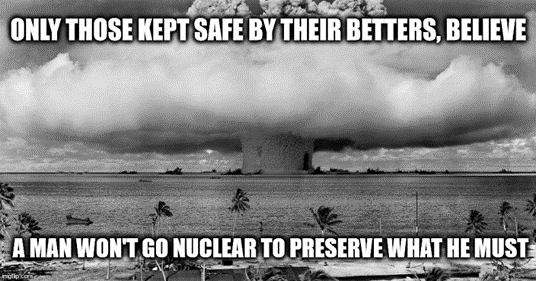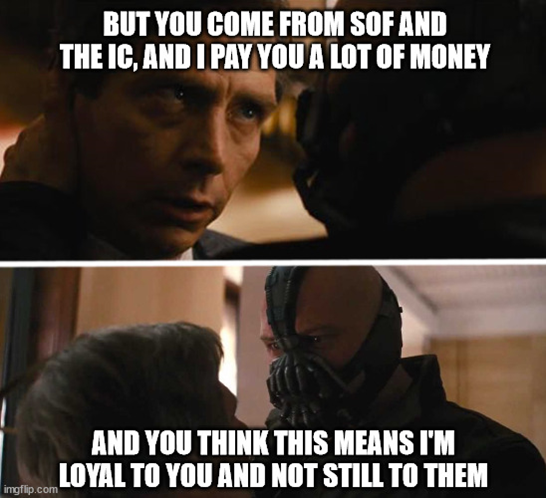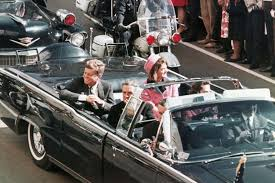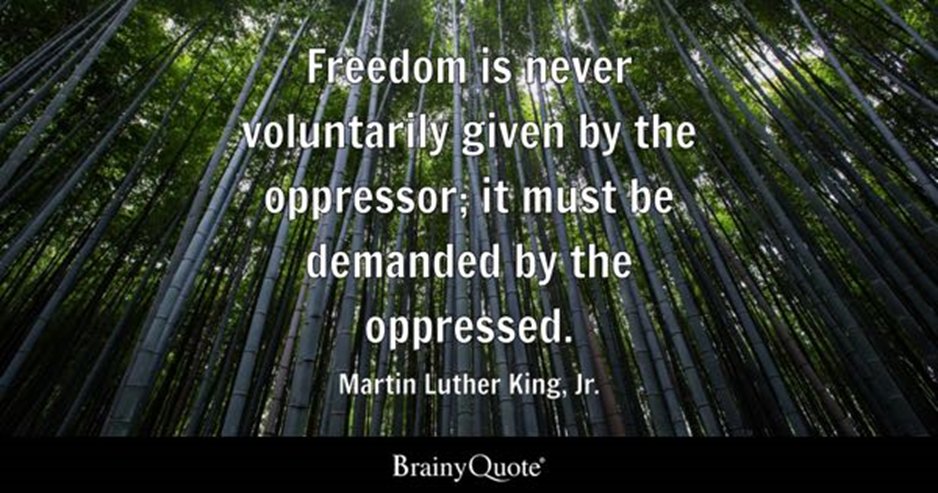The Praetorian Problem – a 🧵
The Praetorian Problem isn’t merely historical. It’s once more a very real threat to Western Civilization. It’s the security state, individuals, entities and institutions, having once again attained near absolute political, martial and economic power. Power they’ll never give up willingly. Praetorians, who, as history’s shown, are bound by no moral constraints related to abandoning, overthrowing and killing leaders and people from the least to the greatest halls of power.
The Praetorian Problem isn’t merely historical. It’s once more a very real threat to Western Civilization. It’s the security state, individuals, entities and institutions, having once again attained near absolute political, martial and economic power. Power they’ll never give up willingly. Praetorians, who, as history’s shown, are bound by no moral constraints related to abandoning, overthrowing and killing leaders and people from the least to the greatest halls of power.

How the Praetorian Guard ruled Rome for three centuries:
- The Praetorians leveraged their unique position as the emperor's bodyguards to influence policy, assassinate rulers and leaders they disliked or who wouldn’t defend and expand their power, and to install new emperors and leaders of their choosing.
- As the only armed force within Rome itself, as the only sanctioned intelligence and security forces for the emperors, military leaders and governors, the Praetorian Guard held unmatched military power in all the capitals and military camps of the Roman Empire, allowing them to act as the powerbrokers and kingmakers and to intimidate virtually all political actors.
- The Praetorian's dual role as both protectors and ever-present threats to the emperor, military and many other imperial leaders, gave them unprecedented access and bargaining power, enabling them to extract concessions and accumulate immense wealth, influence and real power over time.
- The Praetorians leveraged their unique position as the emperor's bodyguards to influence policy, assassinate rulers and leaders they disliked or who wouldn’t defend and expand their power, and to install new emperors and leaders of their choosing.
- As the only armed force within Rome itself, as the only sanctioned intelligence and security forces for the emperors, military leaders and governors, the Praetorian Guard held unmatched military power in all the capitals and military camps of the Roman Empire, allowing them to act as the powerbrokers and kingmakers and to intimidate virtually all political actors.
- The Praetorian's dual role as both protectors and ever-present threats to the emperor, military and many other imperial leaders, gave them unprecedented access and bargaining power, enabling them to extract concessions and accumulate immense wealth, influence and real power over time.
Why Constantine went to war with the Praetorian Guard:
- To restore to themselves the power reduced under Diocletian, the Praetorian Guard declared Maxentius as emperor in 306 CE, setting them on a direct winner-take-all collision course with Constantine.
- Constantine long recognized the Praetorian Guard as a corrupt, treacherous and parasitic force that had for centuries been synonymous with political, military and economic instability. A force that needed to be eliminated for the empire to survive.
- Constantine understood that by defeating and ending the Praetorians he would consolidate power while removing the greatest source of rebellion, and single most powerful obstacle to the implementation of his vision for reforming the empire's military, political and economic structure.
- To restore to themselves the power reduced under Diocletian, the Praetorian Guard declared Maxentius as emperor in 306 CE, setting them on a direct winner-take-all collision course with Constantine.
- Constantine long recognized the Praetorian Guard as a corrupt, treacherous and parasitic force that had for centuries been synonymous with political, military and economic instability. A force that needed to be eliminated for the empire to survive.
- Constantine understood that by defeating and ending the Praetorians he would consolidate power while removing the greatest source of rebellion, and single most powerful obstacle to the implementation of his vision for reforming the empire's military, political and economic structure.
How Constantine finally broke and ended the Praetorians:
- Constantine decisively defeated the Praetorian-backed Maxentius at the Battle of Milvian Bridge in 312 CE, destroying their military power.
- In 313 CE, Constantine officially disbanded the Praetorian Guard, dismantling their fortress (Castra Praetoria) and walling up its gates.
- Constantine dispersed the surviving Praetorian guardsmen to the far reaches of the empire, ensuring they could never again unite as a powerful political force in Rome.
- Constantine decisively defeated the Praetorian-backed Maxentius at the Battle of Milvian Bridge in 312 CE, destroying their military power.
- In 313 CE, Constantine officially disbanded the Praetorian Guard, dismantling their fortress (Castra Praetoria) and walling up its gates.
- Constantine dispersed the surviving Praetorian guardsmen to the far reaches of the empire, ensuring they could never again unite as a powerful political force in Rome.
The modern Praetorians are not immediately what one would think they are. They are not in fact the NSC, CIA, FBI, DOJ, NSA, DHS, JCoS and all the many others. Nor merely the Military-Industrial-Intelligence Complex. These are but the enforcement instruments of the modern Praetorians. The modern Praetorian Guard ARE Wall Street’s titans.
Wall Street played a significant role in the creation of the Military-Industrial-Intelligence Complex (MIIC) and continues to be deeply intertwined and in control of it to this very day. Here are but a few key aspects of Wall Street's involvement:
Historical Role in Creation | Wall Street was instrumental in shaping the MIIC in several ways:
- Post-WWII Consolidation: After World War II, Wall Street facilitated the consolidation of the defense industry, leading to the formation of large defense contractors.
- Financing the Cold War: Wall Street banks provided financing for the massive military buildup during the Cold War era.
- Creation of the CIA: Wall Street capitalists were involved in the creation of the CIA and the national security state under the Truman administration.
Shaping Foreign Policy: The financial sector's interests became increasingly aligned with a militarized foreign policy, influencing decision-making.
- Post-WWII Consolidation: After World War II, Wall Street facilitated the consolidation of the defense industry, leading to the formation of large defense contractors.
- Financing the Cold War: Wall Street banks provided financing for the massive military buildup during the Cold War era.
- Creation of the CIA: Wall Street capitalists were involved in the creation of the CIA and the national security state under the Truman administration.
Shaping Foreign Policy: The financial sector's interests became increasingly aligned with a militarized foreign policy, influencing decision-making.
Current Involvement | Today, Wall Street remains deeply connected to the MIIC:
- Investment and Profit: Wall Street firms heavily invest in defense companies, seeing them as reliable sources of profit, especially during times of conflict.
- Venture Capital: There's increasing involvement of venture capital in funding defense tech startups, with entities like the CIA-funded In-Q-Tel identifying technologies for intelligence gathering.
- Financialization: The globalization and financialization of the economy have increased Wall Street's influence over the defense sector.
- Stock Performance: Defense company stocks have outperformed the S&P 500 in recent years, making them attractive to investors.
- Lobbying and Influence: The financial sector's enormous political clout helps maintain high levels of defense spending.
- Investment and Profit: Wall Street firms heavily invest in defense companies, seeing them as reliable sources of profit, especially during times of conflict.
- Venture Capital: There's increasing involvement of venture capital in funding defense tech startups, with entities like the CIA-funded In-Q-Tel identifying technologies for intelligence gathering.
- Financialization: The globalization and financialization of the economy have increased Wall Street's influence over the defense sector.
- Stock Performance: Defense company stocks have outperformed the S&P 500 in recent years, making them attractive to investors.
- Lobbying and Influence: The financial sector's enormous political clout helps maintain high levels of defense spending.
Implications | This close relationship between Wall Street and the MIIC has several consequences:
- Profit-Driven Policies: There's a risk of foreign and defense policies being influenced by profit motives rather than national security needs.
- Consolidation of Power: The concentration of the defense industry into a few large firms gives them significant leverage over the Pentagon and policymakers.
- Revolving Door: There's a frequent exchange of personnel between Wall Street, defense contractors, and government agencies, potentially blurring lines between public and private interests.
- Innovation and Technology: While this relationship drives technological innovation, it also raises concerns about the militarization of emerging technologies like AI, quantum computing and robotics.
- Profit-Driven Policies: There's a risk of foreign and defense policies being influenced by profit motives rather than national security needs.
- Consolidation of Power: The concentration of the defense industry into a few large firms gives them significant leverage over the Pentagon and policymakers.
- Revolving Door: There's a frequent exchange of personnel between Wall Street, defense contractors, and government agencies, potentially blurring lines between public and private interests.
- Innovation and Technology: While this relationship drives technological innovation, it also raises concerns about the militarization of emerging technologies like AI, quantum computing and robotics.
It all extends further, however, to Organized Crime, due to WWII and the Cold War. | How, through WWII and the Cold War, was Organized Crime, Wall Street and what would become the MIIC all brought together into the Modern Praetorian Guard?
Task to the reader. Go study Meyer Lansky, Salvatore Luciana and the Dulles brothers.
Task to the reader. Go study Meyer Lansky, Salvatore Luciana and the Dulles brothers.
Operation Underworld | The U.S. Navy's Office of Naval Intelligence (ONI) initiated "Operation Underworld," a secret collaboration with organized crime figures to protect the New York waterfront and gather intelligence. This operation was a response to fears of enemy sabotage and the need to secure vital shipping operations. Key aspects:
- Commander Charles R. Haffenden of ONI reached out to mafia figures like Joseph Lanza and Meyer Lansky.
- The ultimate goal was to enlist the help of Charles "Lucky" Luciano, who was serving a prison sentence at the time.
- Commander Charles R. Haffenden of ONI reached out to mafia figures like Joseph Lanza and Meyer Lansky.
- The ultimate goal was to enlist the help of Charles "Lucky" Luciano, who was serving a prison sentence at the time.
Luciano's Involvement | Luciano agreed to cooperate with the authorities in exchange for potential early release from prison. His involvement had several dimensions (that we know of):
- He used his influence to control labor unions and prevent strikes on the docks.
- Luciano provided contacts and intelligence that allegedly assisted in Operation Husky, the Allied invasion of Sicily.
- He used his influence to control labor unions and prevent strikes on the docks.
- Luciano provided contacts and intelligence that allegedly assisted in Operation Husky, the Allied invasion of Sicily.
Wall Street Connection | Being far more devious, never moving so openly, Wall Street's involvement must be inferred from several leading, but not only, factors:
- The financial sector's interest in maintaining stable shipping and manufacturing operations for economic and financial reasons.
- The need for funding and financial expertise to support covert operations, globally.
- The substantive overlap between wealthy bankers, businessmen and intelligence operations during WWII, the Cold War and after.
- The financial sector's interest in maintaining stable shipping and manufacturing operations for economic and financial reasons.
- The need for funding and financial expertise to support covert operations, globally.
- The substantive overlap between wealthy bankers, businessmen and intelligence operations during WWII, the Cold War and after.
Formation of the Intelligence Community | This collaboration laid the groundwork for what would become the modern intelligence community:
- It demonstrated the value of unconventional and illicit alliances to covert operations.
- The experience gained in gathering and utilizing intelligence and influence from non-traditional sources informed future intelligence practices.
- The success of these operations heavily influenced the formation of the CIA and other intelligence agencies post-war and their expansion through the Cold War and after.
- It provided for an ever-increasing amount of illicit, off-the-books, untraceable funding for the Cold War. (see: Iran-Contra, et al)
- It demonstrated the value of unconventional and illicit alliances to covert operations.
- The experience gained in gathering and utilizing intelligence and influence from non-traditional sources informed future intelligence practices.
- The success of these operations heavily influenced the formation of the CIA and other intelligence agencies post-war and their expansion through the Cold War and after.
- It provided for an ever-increasing amount of illicit, off-the-books, untraceable funding for the Cold War. (see: Iran-Contra, et al)
Long-term Implications | The alliance forged during WWII had lasting effects:
- It established connections between government agencies, organized crime, and financial institutions that persisted and expanded to this very day.
- The experience gained in covert operations and intelligence gathering informed future practices in the Cold War and post-Cold War eras.
- It established the precedent for using unofficial channels, dubious and outright illicit and illegal alliances to achieve national security objectives.
- It established into a deeply connected and power Praetorian Guard which has only since consolidated and expanded its power and reach and its ability to, in nearly unlimited fashion, illicitly and uncontrollably fund itself.
- It established connections between government agencies, organized crime, and financial institutions that persisted and expanded to this very day.
- The experience gained in covert operations and intelligence gathering informed future practices in the Cold War and post-Cold War eras.
- It established the precedent for using unofficial channels, dubious and outright illicit and illegal alliances to achieve national security objectives.
- It established into a deeply connected and power Praetorian Guard which has only since consolidated and expanded its power and reach and its ability to, in nearly unlimited fashion, illicitly and uncontrollably fund itself.
To understand the full extent of the threat we must know and understand the ways in which the Modern Praetorians illicitly fund themselves.
There are several core ways in which modern "praetorian" elements such as the intelligence agencies, law enforcement, and financial institutions illicitly fund themselves at local, national and international levels, through engaging in illicit practices (the following is in no way an exhaustive list):
- Defense contracting abuse: The Department of Defense has been accused of wasteful spending and overcharging on contracts, benefiting defense contractors at taxpayer expense. There are allegations of price gouging and hidden monopolies among defense contractors.
- Stock and market manipulation: Some Wall Street firms and traders have been accused of manipulating stock prices through practices like "spoofing" to generate illegal trading profits.
- Drug trafficking connections: There have been historical allegations, particularly during the Iran-Contra affair, of CIA involvement or turning a blind eye to drug trafficking activities that helped fund covert operations.
- Selective enforcement: Law enforcement agencies have been accused of selectively enforcing laws or protecting certain actors engaged in illicit activities for strategic or political reasons.
- Asset forfeiture: Law enforcement agencies have been criticized for abusing civil asset forfeiture laws to seize assets without due process.
- Classified budgets: Intelligence agencies and federal law enforcement often have classified "black budgets" that lack transparency and oversight.
- Revolving door: There are concerns about the "revolving door" between government agencies and private industry, where officials may make decisions benefiting future private sector employers.
- Whistleblower suppression: There are allegations of agencies suppressing or retaliating against whistleblowers who try to expose waste, fraud or abuse.
- Bribery and blackmail: Law enforcement using bribery and blackmail to exert influence, such as J. Edgar Hoover's FBI using illegal surveillance and blackmail against political figures, and intelligence agencies using international NGOs and offshore accounts to bribe politicians, media figures, entertainers, academics, etc.
- Defense contracting abuse: The Department of Defense has been accused of wasteful spending and overcharging on contracts, benefiting defense contractors at taxpayer expense. There are allegations of price gouging and hidden monopolies among defense contractors.
- Stock and market manipulation: Some Wall Street firms and traders have been accused of manipulating stock prices through practices like "spoofing" to generate illegal trading profits.
- Drug trafficking connections: There have been historical allegations, particularly during the Iran-Contra affair, of CIA involvement or turning a blind eye to drug trafficking activities that helped fund covert operations.
- Selective enforcement: Law enforcement agencies have been accused of selectively enforcing laws or protecting certain actors engaged in illicit activities for strategic or political reasons.
- Asset forfeiture: Law enforcement agencies have been criticized for abusing civil asset forfeiture laws to seize assets without due process.
- Classified budgets: Intelligence agencies and federal law enforcement often have classified "black budgets" that lack transparency and oversight.
- Revolving door: There are concerns about the "revolving door" between government agencies and private industry, where officials may make decisions benefiting future private sector employers.
- Whistleblower suppression: There are allegations of agencies suppressing or retaliating against whistleblowers who try to expose waste, fraud or abuse.
- Bribery and blackmail: Law enforcement using bribery and blackmail to exert influence, such as J. Edgar Hoover's FBI using illegal surveillance and blackmail against political figures, and intelligence agencies using international NGOs and offshore accounts to bribe politicians, media figures, entertainers, academics, etc.
The Praetorian Guard of Rome played a significant role in destabilizing the Roman Empire over three centuries, contributing substantively to its eventual collapse. As the elite bodyguard of Roman emperors, military leaders, governors and other imperial leaders, the Praetorians abused their privileged position through violence and corruption. They assassinated emperors and leaders and auctioned off the imperial throne and other seats of power to the highest bidder. Their frequent interference in politics and power created a cycle of instability, where leaders were made and unmade based on the Guard's whims rather than merit or popular support.
This undermined the legitimacy of imperial authority and contributed to a series of civil wars and power struggles. The Praetorians' actions weakened the empire's political structure, diverted resources from addressing external threats, and eroded public trust in the imperial system. While other factors like economic decline, external invasions, and administrative challenges also played crucial roles, the Praetorian Guard's destabilizing influence over three centuries significantly contributed to the gradual weakening and eventual fall of the Western Roman Empire.
The Praetorian Guard can be viewed as a parasitic entity that gradually weakened the Roman Empire from within, ultimately contributing to its downfall. Initially created to protect emperors and Roman leaders, the Guard evolved into a self-serving organization that prioritized its own power and wealth over the empire's well-being. Like a parasite, it fed off the resources and authority of Rome, manipulating succession, extorting payments from emperors and leaders, and interfering in politics and military affairs.
The Guard's actions created chronic instability, undermining the legitimacy of Roman rule and diverting attention and resources from external threats. Over three centuries, this "parasitic" relationship steadily eroded the empire's political, economic, and military strength. The Praetorian Guard's corrosive influence, left unchecked until Diocletian and ultimately Constantine, significantly weakened Rome's ability to address other challenges for centuries, ultimately contributing to the Western Roman Empire's inability to survive and its eventual collapse. The Guard, the ultimate parasite, killed its host.
Modern institutions, the intelligence agencies, law enforcement, and financial entities, the MIIC writ large and its masters, the contemporary "Praetorian Guard," are steadily accelerating the weakening of Western democracies from within. Are we not now, everywhere around us, witnessing a similar pattern of concentrated wealth and power, political interference, and totally self-serving mortal actions that undermine the stability and effectiveness of our current systems of governance, eroding away our way of life? Are we not now watching as the Modern Praetorian Guard steadily kills its host, that host which is our culture, civilization, economy and nation?
• • •
Missing some Tweet in this thread? You can try to
force a refresh

















